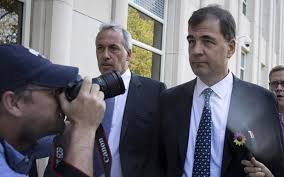By Paul Nicholson
November 16 – The second day of testimony by Alejandro Burzaco in the FIFA bribery case brought more drama to the Brooklyn court after one of the defendants, Peruvian Manuel Burga, was accused of twice making slashing motions across his throat towards Burzaco.
The gestures brought Burzaco to tears with the prosecutor asking the judge to send Burga to jail for his actions. Burga’s lawyer said that he had a skin irritation because of the New York weather, but Judge Pamela Chen ordered Burga to be out under “extreme house arrest” and cutting off his access to phones and computers.
Burzaco said that since he had agreed to co-operate with US justice officials he had received death threats.
His second day in court unveiled in greater depth the bribes that he was paying to defendants José Maria Marin (former president of the Brazilian federation), Juan Manuel Napout (former president of Conmebol and the Paraguayan federation) and Burga (former president of the Peruvian federation).
Burzaco said that in total he paid $4.5 million in bribes to Napout, $2.7 million to Marin, and $3.6 million to Burga, and that he had promised an additional $9.7 million to Napout, $5.9 million to Marin, and $3 million to Burga.
He also testified that media giants Globo, of Brazil, and Televisa, of Mexico, had combined to pay a $15 million bribe to FIFA finance committee chairman Julio Grondona to help them secure broadcast rights to the 2026 and 2030 World Cups. Grondona died in 2014.
Burzaco went into specific detail of meetings held to arrange bribes and his relationship with the defendants.
At the end of 2014, after Grondona’s death, Napout asked Burzaco that he received the same “presidential treatment” that had been given to Grondona, including a from $500,000 to $1.2 million.
Napout was not the only one who wanted an increase in bribe money. Burzaco described a meeting with current Brazilian FA president Marco Polo del Nero in Ascunsion where Nero said he wanted to receive an increase in bribes from $900,000 a year he shared with Marin, to $1.2 million a year, but not until after Marin had left his position so that he would not have to share the money.
Both Globo and Televisa have denied knowledge of any bribes. As have Fox Sports whose affiliate Fox Pan American Sports was a partner with Burzaco’s Torneos y Competencias in T&T Sports Marketing, a company set up to disburse bribes for rights.
None of the three broadcasters have been charged in the case. Globo said on Tuesday that it “does not practise nor tolerate the payment of bribes,” and would cooperate with US authorities. Televisa denied “any wrongdoing…In particular, Grupo Televisa in no way knew of, or condoned, any bribe or other improper conduct.”
Fox Sports spokeswoman said that the T&T partnership was with a Fox Sports affiliate, Fox Pan American Sports, that was majority-owned by a private equity firm, and that Fox Sports had “no operational control” over T&T. “Any suggestion that Fox Sports knew of or approved of any bribes is emphatically false,” she a spokeswoman.
Today Burzaco will be questioned by the lawyers for the defendants. On Monday they argued in their opening statements that none of their clients had accepted bribes.
Contact the writer of this story at moc.l1713621855labto1713621855ofdlr1713621855owedi1713621855sni@n1713621855osloh1713621855cin.l1713621855uap1713621855

